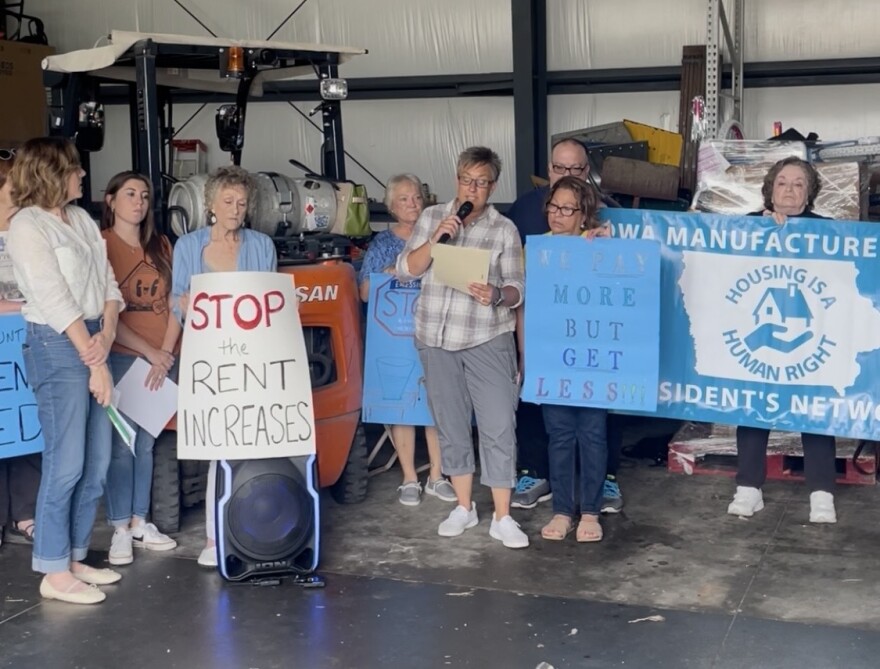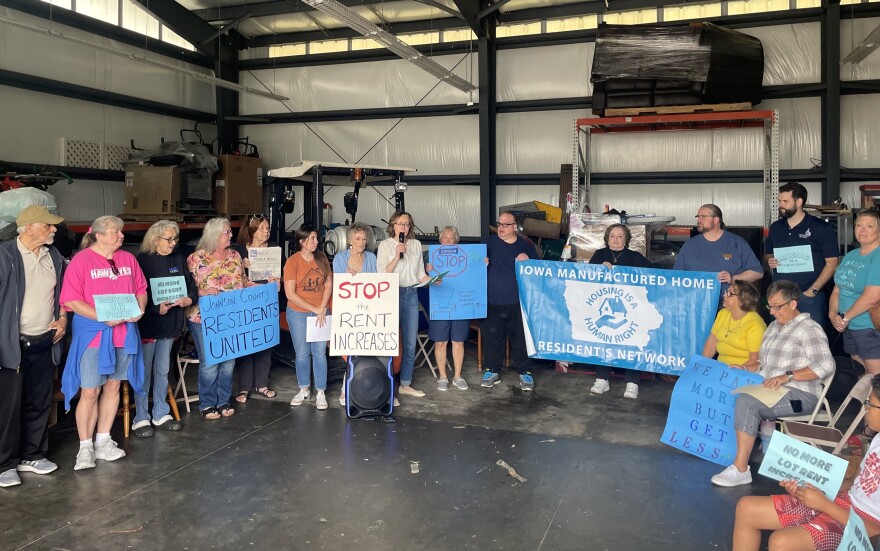When Nicole Platz first moved into Modern Manor 15 years ago, a manufactured home park on the edge of Iowa City, she paid $375 in lot rent.
She couldn’t afford to pay rent for an apartment. However, manufactured homeowners pay lot rent on the ground beneath their units, which they own.
“It was like living the dream,” Platz said. “Nice park, trailer park kept nice. And then, all of a sudden, boom — out of nowhere, it was purchased.”
In 2019, the Utah-based private equity firm, Havenpark Communities, bought multiple lots in Johnson County. A local housing coalition called Johnson County Residents United said the firm initially proposed increasing lot rent at its properties by 50-70%
Alongside the rent increases, residents said they quickly noticed their park conditions deteriorating — particularly their clean water, street lighting, snow removal and tree trimming.
Back when Platz bought her manufactured home, lot rent covered essential services, like cable, trash, water and yard cleanup. Now, she said it’s a fight for fair rent, which has risen despite the fact that it no longer covers many of those services.
“Since Havenpark took over, lot rent increased nearly 40%, yet most of those services have been eliminated, while basic necessities, like clean water, remain ignored,” Platz said. “Our clean water is a growing crisis.”

Platz said her dog died due to calcified stones that emerged after drinking her home’s unfiltered water.
“We need change. We need to ensure safe drinking water, stop excessive rent increases, hold ownership accountable," she said. "The residents of Modern Manor deserve better — fairness, transparency and a livable home."
Linda Hickson, a resident of Lake Ridge Estates in Iowa City, said she has seen her lot rent climb from $430 to $527 in two years.
“We are retired and on a limited income, so it really hurts when they raise it so much,” Hickson said.
The coalition is demanding Havenpark provide clean, reliable drinking water. They also want increased park maintenance and safety measures to improve living conditions, along with a two-year moratorium on rent increases.
A spokesperson from Havenpark issued a statement that the company has invested over $2 million in upgrades and improvements to each of the three locations — Lake Ridge Estates, Modern Manor and Sunrise Village — and plans to spend an additional $1.2 million on capital improvements in the coming months.
“Havenpark is proud to offer high-quality, affordable manufactured homes in desirable areas like Johnson County,” according to the statement. “The health and safety of our residents is our highest priority, and we work to ensure that our properties are always safe and well-maintained.”
A letter from Havenpark to the Johnson County Board of Supervisors dated June 17 stated Havenpark’s investment came after years of disinvestment by previous owners.
“We want residents of our communities to be proud to call them home,” the letter stated. “When urgent problems arise, such as water outages or other utility service disruptions, we work quickly to address them and minimize the inconvenience to residents.”
Lot rent increases pose a ‘serious threat’ to affordable housing options
Jessica Andino, executive director of the Johnson County Housing Coalition, said communities like the ones owned by Havenpark are an accessible means of home ownership for low-income earners.
“For decades, these communities have been a cornerstone of what we consider naturally occurring federal housing, meaning they’ve offered working families, seniors and individuals with limited incomes a chance to own a home, build stability and stay rooted in our communities,” Andino said.
But Andino said the fact that manufactured homeowners still pay rent on the land beneath their units leaves them uniquely vulnerable to certain market pressures, like private equity firms buying up the lots and driving up rent.
“When corporate investors purchase manufactured home communities and rapidly raise those lot rents, often by hundreds of dollars in just a few years, as we’ve heard, they destabilize entire neighborhoods and displace residents who can no longer afford to stay in their own homes,” she said.
Platz from Modern Manor said she suspects moving her manufactured home would be impossible due to its age — one reason some believe the term “mobile home” to be a misnomer. Platz said if moving her home is indeed possible, it could cost up to $10,000.
“There are no guarantees about how much rent can be increased, no limits on excessive fees, and very few requirements for maintenance or on-site management,” Andino said. “Extreme lot rent increases for bad actors like Havenpark pose a serious threat to affordable housing, not only in manufactured home communities, but to all in Johnson County.”
Andino said on-site management, which typically handles tenant maintenance requests, has dwindled, and communicating with Havenpark itself can be a challenge.
Jennifer Scherer, a co-founder of the Iowa Manufactured Home Residents’ Network, said when she tried to reach Havenpark directly, she was redirected to a public relations consultant.
“The only way we can often communicate with Havenpark is in public, through the media, and with the help and support of our community allies and elected officials,” Scherer said.
Investors struggle to raise rents alongside increasing costs
After hearing concerns from residents in 2021, state lawmakers passed House File 2562, which granted some protections to residents of manufactured homes. Specifically, it increased the buffer that community operators have to warn residents of rent increases from 60 days to 90 days.
The law also sets guidelines for notifying residents of utility rate increases and protects residents from an operator’s failure to provide essential services.
However, the law does not regulate how much operators can increase rent — just the timeline within which they must notify their tenants of rent increases.
“So many of these parks have been owned by families for many years. They keep rent stable despite increasing costs. They don’t raise anything significantly,” said Rep. Brian Lohse, a Republican in the Iowa House who was the floor manager of the bill.
As costs climb for local operators who continue to keep rent relatively stable, they may look at selling to private equity firms like Havenpark. And when these buyers take over, they are compelled to raise rents up to market value, often justifying it by making certain infrastructure improvements.
Havenpark has installed new playgrounds and sport courts and has worked to improve landscaping and lighting at the three locations in Johnson County.
But Lohse said sometimes the upgrades fly under the radar, leading residents to question the operator’s justification for raising rent.
“They’re doing those things, but those aren’t the things that people want to see. They don’t really add amenities,” Lohse said. “You know, it’s just better electrical, better sewer water, things like that, which don’t always get the best coverage.”
But residents from several communities owned by Havenpark said essential services like clean water and snow removal are more important to them than other improvements. Some residents reported pouring dirty water from their faucets.
“When you go to run bath water and it’s brown, you don’t want to get into it, and ice cubes have been yellow,” Hickson said about her Lake Ridge Estates property.

But investment firms like Havenpark have capital that allows these parks to continue operating after a mom-and-pop operator decides they want to sell it, according to Andy Conlin, the executive director of the Iowa Manufactured Housing Association.
“Multistate owner-operators have a business model that makes sense on manufactured housing, and they’re maintaining that manufactured housing,” Conlin said. “So, I think they bring some continuity to a business that sorely needs it.”
Conlin said that the Iowa Manufactured Housing Association encourages new operators who are trying to raise rents to make improvements that residents can see.
“You have to phase this stuff in, as you do improvements, to make the investment seem worth it to the residents,” Conlin said. “And that sounds like callous business talk, but it’s how people want to be treated, right?”
Lawmakers are ‘hearing the same issues’
Lohse said legislation to control the amount investors raise rent was blocked by the Iowa Manufactured Housing Association during discussions before the passage of House File 2562.
“The rent control provision in that bill, which did not get passed—that was just going to be a non-starter,” Lohse said.
As lot rents have continued to rise, Lohse said manufactured homeowners have become more vocal at the Statehouse. Unlike the Iowa Manufactured Housing Association, they do not have their own lobbyist. But residents have continued to show up and air their concerns.
"They deserve clean water. They deserve safe streets. They deserve functioning infrastructure.”Jessica Andino, executive director of the Johnson County Housing Coalition
“We’re hearing the same issues,” Lohse said. “Rents continue to go up, and in all fairness, property taxes continue to go up, insurance rates continue to go up, the cost of towing materials and all kinds of things that need to be replaced goes up.”
Lohse said one solution that park residents have suggested to him would be to build better mechanisms for residents to purchase the parks.
“Once we put that power into their hands, you would hope that they would see what the issues are and have a better understanding and be able to better deal with it based on what they know they can and can’t do,” Lohse said.
Conlin said zoning requirements make it difficult to build new communities and infill existing ones. He said cutting through the red tape would be a way to address the area’s housing shortage.
“We have had local governments who have made it difficult for owner-operators to put homes and existing lots in the community,” Conlin said. “That’s kind of the small stuff that we can see some flexibility on. We're going to put owner-operators and manufactured housing communities in a position to make more housing supply.”
But Andino said how operators continue to treat manufactured home residents is both a legal and moral issue. She said it’s about treating them with dignity.
“This is not just a moral obligation for them to step up as park owners, it’s also a legal obligation,” Andino said. “They are here to maintain safe, livable communities for all our neighbors. They deserve clean water. They deserve safe streets. They deserve functioning infrastructure.”






